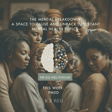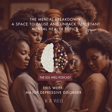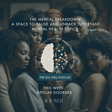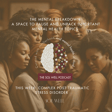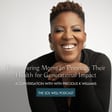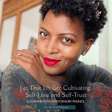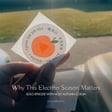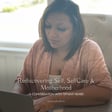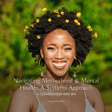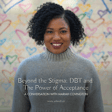Introduction to the Podcast
00:00:05
Speaker
Welcome to the Soul Well podcast, where moms of color find strength and community in the mental health space. Each week, we ignite inspiration as we set our intentions with affirmations and dive deep into honest conversations with fellow moms and mental health experts.
Podcast Mission and Goals
00:00:20
Speaker
We're here hold space for you, to shatter stigmas and elevate the voices of moms of color. We'll fight for policy change, empower you with mindful resources, and most importantly,
00:00:31
Speaker
remind you that you're never alone on this journey. It takes a village to raise a mother. Now let's meet at the well.
00:00:41
Speaker
Today we're holding space for a topic that requires immense tenderness and understanding.
Sensitivity Around Infant Loss
00:00:47
Speaker
The experience of infant and baby loss. We want to acknowledge right at the start that this is a deeply sensitive subject.
00:00:54
Speaker
If listening feels too difficult for you right now, please honor that feeling. We encourage you to prioritize your well-being Feel free to pause, skip this episode, or return to it when you feel ready.
00:01:06
Speaker
For those of you joining us, whether you've walked this path yourself or supporting someone who has or simply wish to understand more, thank you for being here with an open heart.
00:01:17
Speaker
Our intention today is to approach this conversation with compassion, respect, and a desire to break the silence that often surrounds this profound form of grief. We hope to offer validation, support, and perhaps a glimmer Let's gently begin.
Alicia Anderson's Mission on Baby Loss
00:01:38
Speaker
today my guest is alicia anderson she is a life transition and grief support code who helps angel moms honor their angel babies while embracing their unique motherhood journey she pardons with those experiencing grief and life transition to move from existing to thriving through online advocacy BIPOC support groups and her memoir, Still Here, Alicia, has supported countless families through baby loss.
00:02:07
Speaker
Her mission is to end the silence, secrecy, and shame around grief, fostering open dialogue and healing. And with that, let's jump into today's episode.
00:02:21
Speaker
Hey, mamas, and welcome to the So Well Podcast. Hi, I have my guest, Alicia, here. Welcome, welcome, welcome. Thank you for having me. I'm so honored to be here today. Yes, I'm so excited for us to you know finally get a chance to have this conversation.
00:02:37
Speaker
um And you and I connected, I know, on social media. and um But I want my audience to kind of get to know you as well.
Alicia's Journey to Motherhood
00:02:46
Speaker
the The beginning of all of our episodes, we have a segment called The Mom Space,
00:02:51
Speaker
um which is where um our guests have an opportunity to share about their story, their journey, um or anything that they would like to introduce themselves to our audience. ah So what a loaded question, but my name is Alicia. um And I always say my journey into motherhood was nothing like I envisioned.
00:03:14
Speaker
um It started, I always start with my love story. So I met my husband at what my family calls nerd camp. we
00:03:24
Speaker
We were both engineering ah majors. And so we met at this internship in 2007.
00:03:31
Speaker
That's so cool, though. I love it. Thank you. I literally thought I would never see this person ever again. And God had other plans. But um so we dated long distance for four years um and we dated and long distance until we got married. So we never lived in the same space.
00:03:51
Speaker
until we got married in 2012. um And so when people always used to say like, oh, when are you guys gonna start a family? It was like, hey, pump the brakes. Nope, not yet.
00:04:03
Speaker
um I just wanted to kind of like enjoy my husband. And so once we got pregnant, um we were so thrilled.
First Pregnancy Loss Experience
00:04:09
Speaker
And that was 2015 that we got pregnant. um So three years after um getting married and everything was amazing um until it wasn't. And i had a stillbirth for my first pregnancy and that journey um introduced me to motherhood. And so it looked nothing like I thought it would look like. um And it really kind of rocked me to my core, very much shifted the trajectory of where I thought my life would be headed.
00:04:37
Speaker
um So I always say that motherhood was very much unexpected um in the way that I didn't plan it that way. um And then when I had my second son, who I call my rainbow baby, he was born six weeks early. So he ended up in the NICU for a week. And so trauma with additional trauma.
00:05:00
Speaker
um And then my last son was born during COVID. So um just a lot of things that were unplanned in motherhood. So I always say like motherhood is something that we can dream about and we have all our plans and God laughs at those plans. And you just got kind of roll with the flow, you know, as it comes to you, but it's been rewarding. It's been challenging, but I would not trade it for the world.
00:05:25
Speaker
Yes, yes. Thank you so much for sharing that story with me. um And it's a perfect segue um because our um our topic and our theme for today's episode is talking about life after baby loss. And we are going to be digging deeper into your story as you talk to us about what your experiences has been like.
00:05:47
Speaker
And one of the things that you said to me that really resonated with me um is that god we have plans and God laughs as our plans. And that is true for, i feel like, so many areas. And it's just true for all aspects of motherhood. I feel like we get sold this dream of like what it's going to be like when we're a kid, when we're a girl, when we're playing with our dolls and, you know, we're we're like, oh, it's going to be this one way. And nobody, no one truly prepares you for what it's going to be like. And I don't necessarily know if these conversations and books and all that is even going to prepare you because everyone's journey is uniquely their own.
Challenges in Motherhood and Grief
00:06:28
Speaker
as much as we can to share, to uplift, to, it you know, to like share our stories and continue to, you know, put the narrative out there. But, it's is important to note that we can plan, but God still may have another plan.
00:06:42
Speaker
and exactly oh ah that it goes so Exactly. Yes. Yes. um So I want to kind of, you know, since we started on the heavier topic, I want to kind of just continue with that and just talk a little bit about, you know, what that experience was like for you, right? I want to talk about you. I mean, I know,
00:07:05
Speaker
I don't know, actually. I don't know what that experience is like, but I can imagine that it was difficult. And i want you to just kind of talk about, if you can, what that experience is was like for you and your partner, um whether, you know, in the beginning.
00:07:19
Speaker
Absolutely. So, um like I said, we where we waited a little bit to have kids. And so when we were ready, we were like, okay, now we're like fully in this thing. um So when we got pregnant, literally everything went perfectly. Like the doctor told me, Oh, it's probably going to take you about a year to get pregnant. I literally got pregnant the next month after we had that conversation.
00:07:44
Speaker
So it was like very much ease. Everything was like appointments. He looks amazing. You're amazing. You know, like everything was just rolling. Like it, perfect and text wise. And the crazy thing is that my husband and I were like, we're not going to really share that we're pregnant um until after we get out the danger zone, which is definitely a amazing um Everybody's like after your first trimester, then you can share. Yes.
00:08:12
Speaker
Like waited that 12 weeks. My husband's like, do not tell anybody. So we're waiting. And when we finally were able to share, we were so excited. um We probably shared like midway through my second trimester.
00:08:26
Speaker
And at my 28 week appointment, I went in for the glucose test where you take the drink and you wait. And so while we're waiting on the drink to work, the um Nurse said, oh, let me just bring you back and we'll do like an ultrasound just to check on baby, see how he's doing.
00:08:41
Speaker
We go back there. i mean, my husband and I are super excited. And then i just remember her saying, oh, there's not a lot of fluid around the baby. And as a first time mom, I literally didn't know what that meant. i was like, OK, you know, I'll drink more water, you know, like nothing in my mind registered that something was wrong. And so she's like, I'm going to go get the doctor.
00:09:02
Speaker
And I knew that that wasn't good, but my husband was like, just we're just going to wait and hear what she has to say. like He was my voice of reason there. And they took me back to where the doctors were, cleaned off my stomach, took us to this office. I just i can like recall it to this day.
00:09:18
Speaker
It was like a gray wall and Two doctors sitting um at the desk. One had a thing of tissue. So I'm like, okay, processing in my mind, this is not good, but still not knowing what it meant.
00:09:30
Speaker
And they were like, I'm so sorry to tell you, but your baby no longer has a heartbeat.
Coping with Stillbirth
00:09:35
Speaker
and it after that, it just felt like, you know, in the Charlie Brown when he's like, womp, womp, womp, it literally felt like my world was spinning in a matter of minutes. Like my life literally changed in minutes.
00:09:48
Speaker
um So they let themselves out the room for a second just to kind of give my husband and myself some time to process what they were saying. um And then they asked if they could, um when they came back in they asked, you know, how do we want to proceed? And we're just literally like,
00:10:06
Speaker
we don't even know what to do right now. um So they suggested that we come in and have me induced. So at the time I was um like seven, eight months pregnant, seven and a half months pregnant.
00:10:19
Speaker
um And so it was just like going from like, you're almost at the finish line to you're going into the hospital and you have to have this baby.
00:10:29
Speaker
um So they were like, you're going to have to have him. and We'll induce you and you'll birth him. like a normal birth. And so when I went home that night, I, two things stick out in my mind from that experience. One, i Googled, what do you call a baby that dies at 28 weeks?
00:10:48
Speaker
Because I had no idea. That's where I heard the term stillbirth for the first time after me Googling it. um And so I remember texting all my friends and just letting the in and letting them know what happened.
00:11:00
Speaker
And I was like, please don't call me. um I'm trying to process, but one of my friends texted me back and said, i know this is going to sound crazy, but I think you should see your baby. And I know that sounds crazy. Like it's a baby that died, but she was like, my cousin went through this experience and it's a piece of closure that I think you will appreciate down the line.
00:11:22
Speaker
And so that kind of stuck in the back of my mind. um But we Googled what the baby could possibly look like. So I think that kind of helped set my mind up for what was to come. And then the thing I remember is my husband calling all of our parents. And in my book, I talk about how it felt like bombs literally being detonated. Like everybody's like, oh my God, is she like, is she in the hospital? Like they were excited, but it was like, no, the baby is gone.
00:11:49
Speaker
um So I just remember like, literally it felt like we were just ripping the hearts out of our parents one by one. um And lastly, I remember that evening um going home and just journaling, like writing literally till my hand got tired.
00:12:05
Speaker
I cried and I prayed and I said, God, I need you to give me peace. like peace Like I, I, and I could not explain it, but when I went to the hospital the following day, that was a Friday when my appointment was, they induced me that Saturday morning.
00:12:23
Speaker
And, um, I remember walking into that hospital, like, I don't know how going to do this. I don't think I can do it. mine husband's like, we're going to get through this. I don't know what this part of our journey is for, but I think God is up to something, you know? And when we walked in, there was this nurse that literally just hugged me and she's like, we're going to get through this baby. Like, and I just melted like in her arms.
00:12:48
Speaker
And from that piece moving forward, I knew that, you You know, God was in the mix of my story. I didn't know how he would be, but he definitely showed up in a lot of ways in the hospital.
00:13:02
Speaker
Yeah. Yeah. Wow. Thank you for sharing. That's such a um story. And when I hear it, I hear sadness that comes from you. But I also hear like when you say you prayed for peace in the midst of that, that is...
Honoring Her Firstborn, DJ
00:13:20
Speaker
God ordained that is strength, you know, that comes from a mother. And um I'm so, um and you know, when I hear your story, I'm impacted to think about, you know, the journey, right? Like not everybody, like, you know, going through this motherhood journey is never going to be the same and not everybody's story and experiences as, you know, beautiful. um But I love that you were able to see some peace in that.
00:13:47
Speaker
And i heard you say that your second son is your rainbow baby, which I know is a term that's used in this. um And we're going to get to your book as well. But you talked about the detonation of these bombings that you're dropping on the family.
00:14:03
Speaker
um i cannot imagine. i don't have the words. I'm like trying to form like, oh, it is the next question, but also trying to honor the space, right, of it. Yeah, because, yeah.
00:14:16
Speaker
It's hard to hear but I like to tell this piece of my story because there are so many people that experience this and they never get to share this piece.
00:14:28
Speaker
And by me sharing, i want it to be a piece of validation for them and for their story, but also for their babies, because oftentimes these babies are forgotten. um I made that a point in my motherhood journey to make sure that I honored my firstborn son. His name is DJ.
00:14:47
Speaker
We honor him often in our home. um And so it's, I can't get to motherhood without him being a part journey. And so I know it's really hard to hear, but for me, it's almost like he ushered in my motherhood. And so I have to honor presence, his legacy, his life, even though it's very brief.
00:15:10
Speaker
um I give him that space because he's the one that made me a mom and I get to continue with my living children. Yes. Yes. And, and I love that you say that you honor him in the space because um I don't, I know I personally have never heard anybody share a story like this. And so you sharing your story and in the bravery behind doing that, I'm sure will, you know, hopefully help another mom find way to connect with it. Because so often, like you said, they are forgotten. You don't hear about these stories.
00:15:42
Speaker
And do you think that um from your perspective, whether it's coming, whether it's talking to other moms or not, why they may forget or feel as though they shouldn't honor, you know, like I feel sometimes people may just And I don't know, but because I haven't heard these stories. And ifre if we're saying that they're out there, why aren't people sharing them? Do you feel like there's shame or guilt or are you hearing?
00:16:06
Speaker
So there's, I've worked in a lot of avenues in this space. So we call it the baby loss space. But so I literally found like community online with people that have experienced loss.
00:16:17
Speaker
However, a lot of them do not look like us. And so I wanted to make it a point to show that Black women, women of color are in this space and often are the leaders in these categories of loss.
00:16:32
Speaker
So black women are two times more likely to have a loss or stillbirth than white women. um But often we're silenced, even in the community that is meant to support us.
00:16:44
Speaker
You don't often see it. So I wanted to make sure, one, that I was silenced. a face representing these stories that are untold. But two, I think just in general, people are very uncomfortable with grief and loss talking about death. And so it's very hidden, um even though it's in plain sight.
Conversations on Hidden Grief
00:17:04
Speaker
Like you can see when someone is pregnant and you can see when they come back and they don't have a baby.
00:17:09
Speaker
um And so I think it's important to really sit in the uncomfortableness of these types of topics because That's what ushers in the the platform to be able to talk about it freely um like I do. Like I can have these type of conversations with people that have lost babies because it's their lived experience. But for those who have not lived that, it can be very uncomfortable. And so we always say get comfortable being uncomfortable in this space.
00:17:39
Speaker
And I think the biggest thing you can do is be a listening ear because oftentimes we don't share because we don't feel supported in that sharing. And it you have to get very vulnerable when you talk about a baby loss. um And so I think people just aren't ready.
00:17:55
Speaker
But um I think by opening up and having these conversations, it allows us to kind of set the table to have more conversations like this. Absolutely. Absolutely. And thank you for sharing that and coming on this platform to talk about it.
00:18:09
Speaker
One of the things that I heard you say is we call this the baby loss community. Can you talk and maybe describe for us different types of loss and potentially the different emotional and psychological impacts it
Types and Impacts of Baby Loss
00:18:23
Speaker
has on parents? I know that's two questions, but... Yeah, yeah. No, that makes total sense. um So as a background, um after I lost my son, I was like, I know there's like something that I want to do too.
00:18:35
Speaker
Like, I just wanted to make sure that I... other parents that followed in my footsteps. Cause once I learned like, this is very common. Like when I, when I, I was like, Oh, I'm like a one-off, like this doesn't really happen. And then I started to do research and I was like, Oh, this happens very much. So very often.
00:18:55
Speaker
um But we don't hear about it. So I found this like almost, I call it like this underground community on social media And I learned so much. Like, again, stillbirth was the first time when it happened to me. That was the first time I heard about it.
00:19:10
Speaker
So a stillbirth is typically 20 weeks or higher. um So you can have and you can go all the way to full term. um I know moms who have lost their babies at 40 weeks and beyond.
00:19:22
Speaker
um But a miscarriage is 20 weeks or less. And depending on which state you're in they kind of categorize it differently. um And I say there is no grief that is Trump's another.
00:19:37
Speaker
So some parents that experience stillbirth because they are, um you know, we have to birth our babies. you hold You can elect to hold them and see them and have pictures with them.
00:19:48
Speaker
Some parents elect not to do that, um but we did all the above. So you are actually holding. So it's like you're going through a birth, but, you know, they' there's no baby to see afterwards. You know, you don't get to take any baby home.
00:20:04
Speaker
Versus a miscarriage, which is where, you know, you don't necessarily see the baby. It's still in its little fetal form. um And so there's a lot that comes with that where I feel like with me, I at least feel like I got a little bit of closure.
00:20:22
Speaker
With some moms that experience um miscarriage, they don't know the sex of their baby yet um or the gender. They may not be that far along where they even told anyone. So they often do this in silence and behind this wall of secrecy because nobody knew that they were pregnant yet. They they didn't tell anyone.
00:20:45
Speaker
So that's a grief of its own where you're like, you don't feel like you have that piece of closure. I've met moms who have lost their babies in the NICU. um And there's a, you know, they may have a living child that they have to care for.
00:21:00
Speaker
along with the baby that died. And so there's a grief in that. um And there's also, um we call it termination termination for medical reasons. So this is if you get a diagnosis that is kind of grave and you have to make this really tough decision.
00:21:14
Speaker
um And there's grief in that. So there's, I mean, there're no matter where you lose your baby on on how many weeks you were, i always say, if you considered yourself a mom, whether you lost your baby on day one or week 40, it doesn't matter. The grief is still there.
00:21:31
Speaker
Yeah, yeah, yeah, yeah. And when you talk about um grief, can you describe potentially some of the common feelings and experiences of grief and what that was like for you and maybe some other moms that you have may have spoken like oh spoken with before? No problem. Jesus.
Silence and Shame in Grief
00:21:53
Speaker
I think... um Yeah. In my book, I talk about the three S's. So the silent secrecy and shame of grief. Um, and those were like the initial feelings I had, um, silence because again, we don't talk about this often.
00:22:09
Speaker
Um, then the secrecy is because we don't talk about it. We're often isolated. And so we're dealing with all these emotions by ourselves. And we don't know that this is typical part, par for the course when you're grieving. Um,
00:22:24
Speaker
And then the the shame of it all is like, shame and guilt kind of creep their way in because it's like, I wish I could have done something different. I wish I would have spoken up.
00:22:36
Speaker
Maybe if I didn't feel the baby move, I should have said something earlier. and Maybe, you know, there's all these what ifs, maybes. And so if you get boggled down by yourself in isolation, those things can almost like haunt you where it's like, if I only had done this,
00:22:52
Speaker
then this could have changed. um And so you just kind of get boggled down with that, and a lot of those emotions. But the gamut of emotions can arise. Anger, you know, sadness.
00:23:04
Speaker
You can find even joy sometimes in that, which also can fill Like you're dishonoring your baby because it's like, how can I be happy? And I just, my baby just died, you know? So there's just like a gamut of emotions that can arise. And I always say it's different for literally every griever. No no grief is alike, but um just honoring that space wherever you are in in those emotions.
00:23:29
Speaker
Yeah, absolutely. Absolutely. And you mentioned your book, your book, you're it's called Still Here, a Memoir of Love, Loss, and Triumph After Stillbirth.
Alicia's Book 'Still Here'
00:23:40
Speaker
And can you talk about that book? And, you know, we know what kind of brought that about, but can you talk a little bit about maybe what you go through what you but you share in there and what parents can take away from it?
00:23:52
Speaker
Absolutely. So i think I wrote this book threefold. One was to honor my son's legacy um because I and my husband were the only ones in the room when he was born. And so it was like to make sure I stamped the time in his life that he was here, you know, like, because sometimes it can almost feel like a dream. Like, was I even pregnant? You don't have anything to show for that pregnancy. And so it was just to make sure that I honored him, make sure that he had his own piece of my journey out, that I can do that.
00:24:28
Speaker
The second reason was to honor my own grief and I felt that writing was very therapeutic for me. I've always loved to write, but it just helped me to get all the jumbled mess in my mind out.
00:24:42
Speaker
um And so being able to do that in this book form felt very therapeutic for me as his mom. But also very early on in my experience, I knew like I have to share this. And I would, I used to have a fashion blog at the time. And so naturally, because people on my blog saw me pregnant,
00:25:02
Speaker
I talked about my loss openly and I was like, I know this is a hard shift from close, but when I opened up about it, people really resonated with the transparency of it all. And so I knew that I was onto something where i I was like, I have to share my story in order for the person behind me to not feel so alone and know that they too can honor their baby in whatever way they can. And they can honor their grief and their journey as a mom.
00:25:30
Speaker
So those were the reasons that I shared my story. And in the book, I talk about um what it's like when you go in the hospital, um what that experience can be, things that you maybe don't think about. Like, for instance, we had to make a decision on, did we want our son cremated? Did we want him to be buried somewhere? Like, these are things that you don't typically think about so early on in life.
00:25:55
Speaker
We were making a lot of like longstanding decisions in a very quick amount of time. So they're like, do you want to see him? you want to name him? Do you, you know, do you want to hold him? Do you want pictures?
00:26:07
Speaker
And there's like all these questions. And so I wanted to make sure that if somebody happened to go through this experience and they could get ahold of my book quickly, that they knew that process. So they weren't caught off guard like my husband and I were.
00:26:22
Speaker
um And just, it also chronicles me getting pregnant again in just what that was like. And that, that pregnancy was my toughest by far out of the three. yeah Yeah. Yeah.
00:26:36
Speaker
yeah Emotionally, physically, like it was a lot. So I was able to chronicle what that process was like for me also, because we got pregnant six months after died. Yeah.
00:26:46
Speaker
Yeah. I was going to ask if there if there's anything in that story that you want to share because you talked you know you spoke about in in loss, there's also joy and there's also you know potentially
Emotional Challenges of Second Pregnancy
00:26:59
Speaker
happiness, right? And six months is so soon after. And how do you how do you shift psychologically from loss to let me be excited about this new life or in being scared potentially, right? You're full of what could potentially happen. Can you talk a little bit about what you went through and that in that and your husband?
00:27:18
Speaker
Absolutely. So I think the biggest thing for me um and my husband were that we were like, we're just gonna let God do this, whatever his timing may be. And so we weren't necessarily not trying to have another baby, but we weren't like, it has to happen right away. And so it happened. And when we got pregnant, the first time we told no one. that This time we literally were like, call your parents, call our brothers and like,
00:27:44
Speaker
We need to have ah village around us to insulate us from what we're about to experience. um And like I said before, I think this was my toughest pregnancy. Physically, i was fine.
00:27:55
Speaker
Mentally, mess. um And so i think it took a lot of me being connected through my faith. with God, I would wake up, I would journal, I would read scripture, devotionals, my family, my dad is a pastor.
00:28:11
Speaker
Um, so I was rooted in faith, but I really, my faith was tested for sure with motherhood. Um, just like really believing in what God has said for us, for our family.
00:28:25
Speaker
Um, so we would have our family like pray for us and, um just speak encouraging words over us. And I think those milestones where it's like, okay, my son died at 28 weeks.
00:28:37
Speaker
So when, you know, up to that point, I like struggle. I'm like, oh, my God, am I going to fall off the cliff when I get to 28 weeks? Is the same thing going to happen? And for me, it did not. um My son was born six weeks early. So we had to deal with the process of him being in the NICU for a week. And that was a lot because I was like excited he was here. But it's like that trauma all over again of leaving the hospital without him.
00:29:03
Speaker
for a week. So a lot of things arose during that process, but I think um it was nice to have a village around me on that second pregnancy, um even though it was really difficult. And I think the one thing that I love that I did during that pregnancy, on I kept DJ along with my rainbow baby, who's Grayson.
00:29:30
Speaker
I honored them both. And so um when I had my baby shower, we had a rainbow shower. And so it was everybody came and they dressed in like different colors of the rainbow.
00:29:41
Speaker
And my friend that put it together was with me when I lost my son. And so she was the person that coordinated it. And i told her i had one condition. I wanted to make sure DJ was honored in that area.
00:29:55
Speaker
capacity but also to celebrate Grayson. And so I tell all lost parents that if you are pregnant again, there is no shame in honoring your baby because they were real.
00:30:10
Speaker
Their story matters just as much, but also you you don't have to feel um conflicted in the celebration and the joy of honoring new life. And so you can honor your baby that died and celebrate your baby to come. So um it it was a tough one, but I am grateful for the experience to mother again, um living children's help.
00:30:36
Speaker
Yeah, absolutely. Can you, if you, it's, i'm I'm sure it's probably going to be hard, but if you could say um something that this experience taught you, right in your journey, right, like, it could be one, two, three, five, however many you want to, you want to drop, but something that this experience taught you going into your new experience with your, year you know, your two living children, like, what has this experience given you to take with you?
00:31:04
Speaker
Oh my gosh, so many lessons. um And I think looking back, it's a lot easier when you're in it. It doesn't, it's it's like, there's literally nothing, no joy. Like even when I had my rainbow baby, I'm like, but I still have a baby that's missing, you know?
00:31:20
Speaker
And like, when people see my my family out, they think, oh, you have two babies and that's, you're complete. And it's like, no, there's always something missing. um But one thing I think it taught me for sure was empathy because you literally, like if you saw me on the street, you would not know that I had a baby that died. And so it taught me that literally everyone is dealing with something and that we should treat people with care, with kindness, because you literally don't know How your interaction with someone else can impact them, whether for good or bad.
00:31:55
Speaker
um i remember in grief where there were people who said the most ridiculous things to me that altered my day and those that really embraced what I was going through and how that made me feel.
00:32:07
Speaker
um And so I try to be somebody that can bring light to people, no matter what. they It doesn't have to be baby loss. But I mean, there's people that are just dealing with so many things on a daily
Lessons of Empathy and Faith
00:32:18
Speaker
basis. And so I think that was one of the biggest lessons it taught me was really be empathetic to people because everyone is carrying something.
00:32:26
Speaker
um yeah And two, just relying on God. Like I heard it as a kid. I literally grew up in church. So you hear these things, oh God, trust God, rely on your faith. You know, you need faith that's the size of a mustard seed and all that.
00:32:41
Speaker
And it's like, yep, that's cute. Until you get thrust into the... Until you're in the storm. I really to hold on to the... I really feel like I'm hanging on by like two fingers, you know? Right.
00:32:54
Speaker
That mustard seed is looking real small right now. Lord, when you said mustard seed, I get it. Because literally that's all I got. I don't have much give you.
00:33:05
Speaker
But like just to know, eat I had some, me and God had some, we had some conversations. Really me? Like why would you let this come me? but once I was like really by myself and I felt his presence in the grief, but also in the joy of, you know,
00:33:22
Speaker
Being able to say, i have my rainbow baby and I have two living kids that you know, they have just sprinkled joy back into my life. You know, it it felt good to be able to say like, this is literally my testimony. You know, like when you're younger and you hear testimony service, you're like, okay, you know, but it's like, this is real. Like right I have seen the darkness and I got pulled into the light. um And so just try again to be that light for other people to know like,
00:33:52
Speaker
hold on. And it may not look how you think, like some people never get their rainbow baby and being okay, whatever the journey, it's like, you have to make a life that you can be incredibly proud of. um And sometimes that may not include motherhood, even though you were on that journey for some time. So I try to meet people where they are in whatever situation that they may be dealing with.
00:34:17
Speaker
Yeah. Yeah. That's beautiful. And um And I think that's something that more people, could you know, baby loss or not could take with them just in general. There's so much going on in our society, in our world, and it takes nothing to not be.
00:34:37
Speaker
I want to say his choice words, but, you know, you know what I'm saying? Like, yeah you don't even have to say anything but to just be not nice or unkind for no reason. You know what I mean? There's so much going on.
00:34:50
Speaker
um And so I wish more people could take that. um I want to shift into just kind of asking you in terms of like, a lot of our conversations on this episode talk a lot about society. And, you know, we are African American, Black women, women of color in society. And you talked a little bit earlier about how there's not a lot of us in this community.
00:35:11
Speaker
And it's obviously but probably... because of the societal stigmas that surround the loss. Can you talk a little about some of those societal stigmas that you see or that are happening?
00:35:27
Speaker
So I want to preface this by saying I used to do support groups for this organization. And this the support group that I facilitated was specifically for um Black, Indigenous, and people of color And so that space was so rewarding because we really got a chance to by take off the mask that we typically wear out um and get very real. And one of the things that I heard Black women specifically say often is we are not afforded space to grieve.
00:36:01
Speaker
typically in the world, we are considered the workhorses. You're so strong, black girl magic. You know, everything is like about what we can produce.
00:36:12
Speaker
And overcome. Who we are. Yes. You're, you're so strong. and, and in one of our support groups, I literally had this epiphany of like, our ancestors literally went through trauma daily and literally had to get up and act like nothing happened. So it was literally a matter of life and death.
00:36:33
Speaker
Like if they did not do the work, they could, you know, their life could be taken. And so I think ancestrally, We've learned how to push all the things down. It was a it was a piece of survival.
00:36:49
Speaker
um So I honor that in that a lot of us don't share our story because we either don't feel it's significant enough. We see examples in the world where it's like, oh, I have to be strong. And so...
00:37:02
Speaker
We don't allow ourselves the moment to be vulnerable and to break. And I think it's so important that you allow yourself to literally sit in the grief um as somebody that has experienced it, because I always say you cannot outrun grief. It will find you. It may show up in a way that you don't want it to, but it's fine.
00:37:21
Speaker
and you somehow, some way. So I always say for the griever, sit in it, allow it to like, let the emotion come, get mad, be sad, like let the tears come. That's okay. That's part of the process. And like, if you think of it from a standpoint of grief is love,
00:37:39
Speaker
It makes sense. Why wouldn't I leave the baby that I loved? Like, right. That's part of the process. So for that piece, the griever absolutely honor whatever grief brings. Like, you don't have to be afraid of grief. It is literally a part of life's process. Right.
00:37:57
Speaker
Everybody grieves something. But for the people that are the support of the grief, I would say honor the space of one being uncomfortable. It's going to get uncomfortable. Like we don't want to talk about babies that die. It just it is what it is.
00:38:10
Speaker
But if you can just be a safe space, a listening ear, and sometimes that means sitting in silence, but your presence alone can make the world of a difference.
00:38:21
Speaker
But even if you want to do something small, like if the, if the person, the griever wants to say their baby's name, use the baby's name. Like, it's okay. Like a lot of people are like, well, I don't want to make them sad. We're already sad. It's okay.
00:38:35
Speaker
You know, like yeah you can talk about it. Um, if there's a specific day for my, my son was born January 18th. So we considered that his birthday. And so People text me on his birthday. um You know, like acknowledge those little that little thing can mean so much, um you know, down the line, especially after people start to like, you know, the condolences stop the the cards.
00:39:01
Speaker
I mean, the support stops like just remembering that one date every year and decide I'm thinking about you today. I know today's worth rough. That's it. It doesn't have to be profound. Like, you know, just really sitting with the griever and allowing them, you know, to dictate the pace of how you interact and not them like isolated.
00:39:25
Speaker
Yeah. Yeah. Yeah. I mean, and then, and then also, I guess, one of the questions I have for, for moms who may be going through this experience, right. And,
00:39:36
Speaker
They're not really sure where to come, you know, and they get your book and they're like, okay, but what if I don't want to do any of this? What if I just want to forget? Have you experienced women who... And and like how do you process that? like Don't text me. Don't just let me let go. yeah I always say take the cues of the griever because literally grief is different. For me, talking about it, sharing it, speaking on it, social media, it was all part of my journey.
00:40:03
Speaker
But there are some people that are like, I don't want you to say my baby's name. I don't want you to honor it. want to just... keep it moving. And in that, honor that, like, let them set the pace of where it is. But I think oftentimes we assume that, you know, um people don't want to have these type of conversations and it just may be because they don't feel safe. And so they don't. um And that's just their mechanism to like, keep themselves safe. Their story is sacred and you don't have to share your story with everybody. That's another thing. Like,
00:40:37
Speaker
Yes, I'm vocal about it because i feel like this is part of my ministry, my journey. But you don't have to share your story with everyone. um You can even, if you share it with yourself, like a lot of times we don't give ourselves the space to go there because it's scary.
00:40:53
Speaker
Like, to sit in your grief, to acknowledge this feeling because you don't know what can come up behind that. So I say, if you don't want to talk to anybody, write it for yourself, make a video of yourself talking about it. And it it doesn't have to see the light of day, but just so you can have it for you to get it out.
00:41:10
Speaker
And you don't have to talk about it ever again if you don't want to, but always take use from the griever for sure. Yeah. Yeah. and um you just kind of touched on something that, that segues into my next question.
Supporting Grieving Fathers
00:41:22
Speaker
It's just like, what types of supports,
00:41:24
Speaker
are out there for moms who, and moms, I keep saying moms, to this episode shows for moms, but dads experience loss as well. So what types of supports are out there for parents who are experienced in child loss?
00:41:37
Speaker
So there's a lot of different avenues and it's a lot more than even when I first entered the space. My son was born in 2016. So it's been nine years Since his death. um And I've seen the baby loss community online grow. So there's like literally dozens, hundreds of of um like content creators that talk about grief, but you know, in general, but also specifically baby loss. So I say find who resonates with you because not everybody has your same moral compass and everybody doesn't treat grief the same. So find, especially when you're like new in the space, it can be overwhelming. It could be triggering.
00:42:24
Speaker
And you may be even offended by things that some people say because, You know, they may not align with your your belief system. So find your tribe. um But there's also support groups.
00:42:36
Speaker
um There are like retreats that you can attend. um And for dad specifically, it's a little bit tougher just because of, again, the stigma of what it's like for the guy to you're supposed to be the strong one. You know, there's all these things.
00:42:52
Speaker
what it looks like to grieve. um And so I want to mention in my book, my husband actually wrote a chapter and I was lured when I read it the first time, like,
00:43:04
Speaker
through him submitting to my editor and I was like I didn't know any of this happened because he wanted to be so strong for me that he was he suppressed his grief to make sure that I was okay and so check on the dads too that they are green oh and they need support in that just in society in general men don't typically share, like, especially these type of feelings that are so vulnerable.
00:43:30
Speaker
So give them the space, even if they don't want to. My husband did a lot with, like, physically went to the gym, played basketball, you know, hung out with friends, but give them, make sure they have an outlet as well to.
00:43:41
Speaker
Yeah. Yeah. That's great. And I'm glad you mentioned, I'm glad you mentioned that. We don't want to forget the dad. oh i And you raised this question, and not this question, you raised this topic of ah advocacy and awareness um Why is it important to raise awareness about stillbirth and maternal loss for
Advocacy for Stillbirth Prevention
00:44:01
Speaker
and what um Again, it's just so important because our numbers are increasing. America's numbers in general for loss are horrific. Like as a developed country, we are like at the bottom um when it comes to um measures to prevent this. And oftentimes it is preventable, um but because there aren't parameters in place to catch it early on,
00:44:27
Speaker
We lose baby. So the number that sticks in my head for stillbirth is 65. So 65 families every day lose a baby to stillbirth. And you wouldn't know that because we don't talk about it. And so I actually have done some um advocacy work with a group group.
00:44:45
Speaker
there, I have, I took a screenshot because I wanted to make sure I said it correctly, but um it is SHINE for Autumn is the legislature legislationure that we've we've been trying to pass. And SHINE stands for Stillbirth Health Improvement in Education.
00:45:03
Speaker
um And this is from a mom who also lost her daughter to stillbirth 10 plus years ago. And she wanted to do something to help Other families prevent this outcome um because her was actually preventable.
00:45:17
Speaker
And so we've done rounds and rounds of um trying to get this legislation passed in Congress. We've gotten close um the past years, but it still has not...
00:45:31
Speaker
passed. And this is just to keep record of what's happening because a lot of times they're not tracking what's happening. So we can't fix it if we don't even know like why we need funding for research and things like that. So that is important.
00:45:47
Speaker
But also just if you were, you don't have to be on a grand scale, like just supporting the people in your community in offering up resources. So again, there's countless things online that you can get connected to. And if any of your listeners want those resources, I can absolutely point them in the right direction if they need that support.
00:46:08
Speaker
Yes, absolutely. Which just goes right into my next my next question, which was which was just going to be about you and your work and how listeners can support with support you, work with you. Do you offer any programs?
00:46:21
Speaker
a Can they meet with you in any groups? like What are What are you doing in the space um that any of our moms can connect with you on? Whether it be just asking a question of ah a link, and even.
00:46:32
Speaker
ah Yeah, can you share that? and Mostly on Instagram. I know a a lot of people have said I should get on TikTok. I don't know how much longer it'll be here, but. child Not long. know But I am on Instagram. So if you DM me to say, hey, like, this is what I'm looking for.
00:46:50
Speaker
But if you would like to work with me more one on one, um I have started a coaching business. And so I help with loss and just life transitions in general.
00:47:02
Speaker
Um, and it's just important that we hold space for our grief. And so, you know, i try to be a resource any way I can. So my Instagram is Allie, A-L-I, Andy, A-N-D-E, Enterprise, E-N-T-R-T-E-R-P-R-I-S-E.
00:47:18
Speaker
Um, so if you find me there, we can kind of connect and then I can point you to whatever you need. Um, please feel free to reach out. Um, I love it. Yes. And, and we're going to have all of that in the show notes and it'll be linked. So if anybody is driving and don't need to type it right down right now, you will have, you'll be able to get it. Be safe. We will link it for you.
00:47:41
Speaker
um And just to kind of get us to our closing of the episode, I always ask my guests if they could give um our moms, our listeners a message of hope and healing.
00:47:52
Speaker
what would it be, right? Like, what would you share? What would that lasting message be? I think the biggest thing is honor your grief, wherever you may be. um And you don't, it doesn't have to look like anybody else. Like your grief doesn't have to look like mine, where you're an advocate and you're writing books and speaking out loud. Like it could literally be a quiet force that only you acknowledge, um but do whatever feels right for you as the griever. And it will come to you. And it changes.
00:48:23
Speaker
As the years pass, I'm nine years into this. So my grief on day one looked very different from year nine. um So honor where you are in your grief. And if I could share, um there's two scriptures that I wanted to share today.
00:48:38
Speaker
um One is 1 Peter 5 and 7. Let me make sure I have it. And that is, sorry.
00:48:49
Speaker
So it says cast all your anxiety on him because he cares for you. um So God knows he sees you. He will sit with you in your grief, in your time of need. But the last one I wanted to share it is my favorite verse, Jeremiah 29 and 11.
00:49:04
Speaker
And it's for I know the plans I have for you, declares the Lord, plans to prosper you and not to harm you, plans to give you hope in a future. So even though loss can feel um encompassing, there is a future of hope that God wants for you. And so ride the wave of grief, but there is light and love and hope and joy and all those things on the other side. So don't give up and find community. And if you need community, find me. i will try to help you as much as I can, but don't do this alone. You don't have to do this alone. Yes, yes, yes, absolutely. Thank you so much for saying that.
00:49:42
Speaker
um I love that you closed you don't have to do this alone. Our mantra at SoWell is it takes a village to raise a mother because it does. and so whether and whether and whether your journey into motherhood is in baby loss or you in pregnancy or you have a remote baby, whatever that experience may look like, don't do it alone.
00:50:04
Speaker
As my guest has said here today.
Conclusion and Hopeful Message
00:50:07
Speaker
I'm going to share resources um from from you on in this show, but also um if anyone is looking for a community at all, we have our Moms Space community that you can join as well.
00:50:17
Speaker
I know that today's topic was really heavy and deep, and I'm so thankful for you for sharing your your mom and your motherhood journey with us today on this episode. I like i truly do appreciate you being an advocate in this space, being a Black woman in this space, speaking up so ferociously and with faith as well. um Because, you know, ah like I shared earlier with you, it's not seen.
00:50:41
Speaker
And so I'm thankful for you being on this platform to do that for our moms. Thank you so much for having me. I appreciate this. And I pray for all of your listeners, um no matter where they are in their motherhood journey, that they be kept in the challenging times, but also that they find joy.
00:50:58
Speaker
Yes, absolutely. Thank you. Thank you so much. Until next time, mama, stay well and stay whole. And I'll see you next time on the So Well Podcast.
00:51:09
Speaker
Hit the notification bell wherever you are listening to us today and join us next week as we delve into more mental health conversations. The So Well community offers a safe ground for the transformative healing and restoration of intergenerational trauma, ensuring moms of color have a space to rewrite their stories, recover, live well, be seen and heard.
00:51:32
Speaker
Join us online and on Instagram at So Well for daily inspiration, blogs, events and more. See you next time.
00:51:55
Speaker
The Solwell Podcast is for educational and entertainment purposes only. We are not doctors, therapists, or medical professionals, and the content shared here is based on personal experiences and research, and it should not be taken as medical or therapeutic advice.
00:52:11
Speaker
Please consult a qualified professional for any mental health or medical concerns.
![Life after [baby] loss A conversation with Alishia Anderson image](https://media.zencastr.com/cdn-cgi/image/width=54,quality=85/image-files/61fb5028559b7100aee9f217/492cabf0-4479-488c-b19c-2873fe6bdce8.png)
